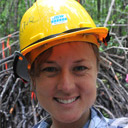
LIMA, Peru—Growing discussions about forest-carbon initiatives in Myanmar could prove beneficial to the rights of local and indigenous communities there, as drivers of deforestation grow in the Southeast Asian country.
Naw Ei Ei Min, the Director of an NGO from Myanmar, Promotion of Indigenous and Nature Together (POINT) spoke at a civil society session at the Global Landscapes Forum in Lima about the development of REDD+ in Myanmar and the challenges faced by indigenous people as they practice shifting cultivation.
Due to pressure from external forces and lack of legal protection, they are reducing the traditional amount of time they leave fields fallow, which is driving increasing deforestation, she said.
“Since there is no protection in the law, any time there is illegal logging coming in, or if companies get a concession to the area, they have to move, relocate further into the forest,” Min said.
“There is a pressure for them to find alternative livelihoods, but they don’t have sufficient education, and this leads to some social issues – so they’re really in need of legal and technical support for the future sustainability of shifting cultivation practices.”
There is little awareness among the community about REDD+ programs in Myanmar, she added.
“Although they are sometimes invited for consultation and discussion, if they don’t have the background and a full understanding then they cannot make a full comment on the process,” she said.
Her organization conducts awareness-raising exercises and is engaging in the national REDD+ process, which she says has enabled people in Myanmar to talk about things that previously went unsaid.
“REDD+ brings along with it safeguards, discussion of indigenous people’s rights, discussions of land tenure and collective rights – all things we haven’t discussed in the past in Myanmar is coming up along with REDD+,” she said.
“So whether REDD+ comes in 2020 or not, we hope the process will allow communities to improve their voice.”
Watch an interview with Naw Ei Ei Min, above.
We want you to share Forests News content, which is licensed under Creative Commons Attribution-NonCommercial-ShareAlike 4.0 International (CC BY-NC-SA 4.0). This means you are free to redistribute our material for non-commercial purposes. All we ask is that you give Forests News appropriate credit and link to the original Forests News content, indicate if changes were made, and distribute your contributions under the same Creative Commons license. You must notify Forests News if you repost, reprint or reuse our materials by contacting forestsnews@cifor-icraf.org.













